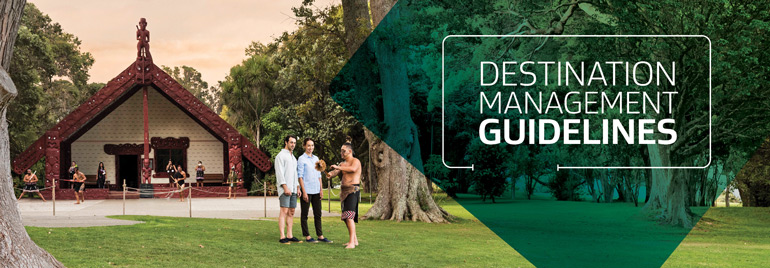Destination Management Guidelines
These pages describe what Destination Management (DM) is and how to go about creating a DM plan for your region or community. They provide suggestions on components that could be included in a plan and questions to stimulate discussion and identify gaps, opportunities and areas for further investigation.
On this page I tēnei whārangi

These guidelines are based on research, international best practice, case studies and industry consultation. They are practical tools that aim to assist people and organisations who have a role in supporting, growing and developing the tourism economy within their region, district or community. This may include Regional Tourism Organisations (RTOs), Economic Development Agencies (EDAs), central Government agencies, regional/local government, Māori/iwi/hapū organisations, tourism enterprises and key infrastructure owners. They can also assist broader community groups such as Chambers of Commerce and Business Associations that are part of the ecosystem of a destination.
This is the web version of the Destination Management Guidelines.
These web pages are a guide only. They should not be used as a substitute for legislation or legal advice. The Ministry of Business, Innovation and Employment is not responsible for the results of any actions taken on the basis of information in these web pages, or for any errors or omissions.
See below for a link to the PDF version for printing.
In this section I tēnei wāhanga
Background
Growth in global travel means that some destinations around the world are under pressure from tourism, resulting in overcrowding and negative effects on the quality of the visitor experience, the environment and communities.
Destination Management and why it's important
Destination Management brings together different stakeholders to achieve the common goal of developing a well-managed, sustainable visitor destination. It is an ongoing process that requires destinations to plan for the future and considers the social, economic, cultural and environmental risks and opportunities.
An integrated Destination Management approach
Destination Management requires a holistic and integrated approach.
Developing a Destination Management plan
Destination Management planning can apply to a macro-area, region, district or specific location. All of these layers are relevant in the context of the destination and stakeholder needs.
Components of a Destination Management plan
There are 16 main components in a Destination Management Plan.
Appendix: useful links and information sources
A list of organisations involved in New Zealand-Aotearoa's tourism industry.

